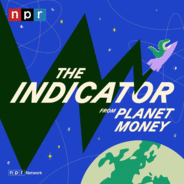Can you tell me how to get... how to get to Indicators of the Week? This week's econ roundup looks at Target's sagging sales, Klarna's pay-later problem, and Sesame Street's new streaming address. Related: When do boycotts work? (Apple / Spotify) Buy now, pay dearly? For sponsor-free episodes of The Indicator from Planet Money, subscribe to Planet Money+ via Apple Podcasts or at plus.npr.org. Fact-checking by Sierra Juarez. Music by Drop Electric. Find us: TikTok, Instagram, Facebook, Newsletter. Learn more about sponsor message choices: podcastchoices.com/adchoicesNPR Privacy Policy

Wirtschaft
The Indicator from Planet Money Folgen
A bite-sized show about big ideas. From the people who make Planet Money, The Indicator helps you make sense of what's happening in today's economy. It's a quick hit of insight into money, work, and business. Monday through Friday, in 10 minutes or less.
Folgen von The Indicator from Planet Money
300 Folgen
-
Folge vom 23.05.2025Target, Klarna and Sesame Street's new addy
-
Folge vom 22.05.2025How Trump is making coin from $TRUMP coinJust before Trump began his second administration in January, he and his business partners launched the $TRUMP coin. It's a meme coin that quickly raked in hundreds of millions of dollars. And there's a lot of earning potential still left on the table. Is any of this legal? Today on the show, we examine how the $TRUMP coin works and talk to an expert about how the president's meme coin gambit interacts with the Foreign Emoluments Clause of the Constitution. Related episodes: How the memecoin game is played Did Trump enable insider trading? For sponsor-free episodes of The Indicator from Planet Money, subscribe to Planet Money+ via Apple Podcasts or at plus.npr.org. Fact-checking by Sierra Juarez. Music by Drop Electric. Find us: TikTok, Instagram, Facebook, Newsletter. Learn more about sponsor message choices: podcastchoices.com/adchoicesNPR Privacy Policy
-
Folge vom 21.05.2025The old trade war that brought foreign carmakers to the U.S.President Donald Trump wants more products made in America, and he's not afraid of a few trade wars to make it happen. Back in the 80s, a different trade dispute brought new manufacturing to the U.S. Today on the show, how former President Ronald Reagan used the threat of trade protectionism to bring car-making stateside, and why the same strategy might not work today.Related episodes:The tensions behind the sale of U.S. Steel (Apple / Spotify)Tariffs: What are they good for? (Apple / Spotify)For sponsor-free episodes of The Indicator from Planet Money, subscribe to Planet Money+ via Apple Podcasts or at plus.npr.org.Fact-checking by Sierra Juarez. Music by Drop Electric. Find us: TikTok, Instagram, Facebook, Newsletter. Learn more about sponsor message choices: podcastchoices.com/adchoicesNPR Privacy Policy
-
Folge vom 20.05.2025The rise of the credit card airport loungeWe are back to answer your questions, listeners. Today on the show, we tackle three big questions: Are airport lounges worth it for credit card companies? How effective have carbon taxes been for Canada? Why is gasoline getting more expensive over the last few months as the price of crude oil has sunk? If you want to submit your OWN question to be considered in a future episode, send us a message at indicator@npr.org. Related episodes:Can cap and trade work in the US? (Apple / Spotify) A Quick History Of Slow Credit Cards Breaking down the price of gasoline (Apple / Spotify) For sponsor-free episodes of The Indicator from Planet Money, subscribe to Planet Money+ via Apple Podcasts or at plus.npr.org. Learn more about sponsor message choices: podcastchoices.com/adchoicesNPR Privacy Policy
